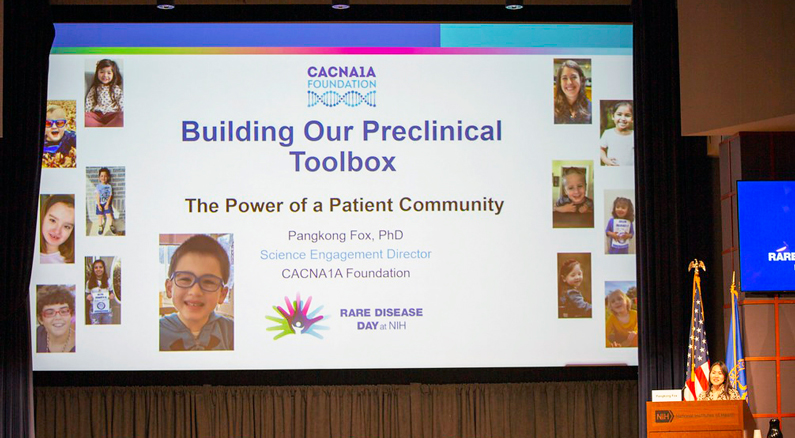Research, industry and advocacy join on NIH Rare Disease Day
Event returns to NIH Visitors Center

After two years of online-only participation, NIH Rare Disease Day 2023 (RDD) returned on Feb. 28 to its previous hybrid format for a vigorous day of renewed, in-person communication and networking in the rare disease community.
Organized by National Center for Advancing Translational Sciences (NCATS) and the Clinical Center, RDD brings together diverse research interests in government and academic settings. It also brings together patient advocacy organizations, including representative patients and families affected by rare diseases. Sharing highlights in rare disease research, recognizing those who are making exceptional contributions and proposing an agenda to keep research moving forward, Rare Disease Day is established as a cornerstone event in the field.
Several presentations discussed relevant activity at NCATS, including the Division of Rare Disease Research and Innovation, the Genetic and Rare Diseases Information Center resource, the Rare Disease Alert System project and the newer RARe-source program.
The Clinical Center's own involvement with clinical trials was addressed by its Office of Patient Recruitment. They focused on resources to help volunteers with a rare disease find useful clinical research studies at the NIH.
"Our mission is to support the research performed at the Clinical Center by coordinating the referral process as the primary point of contact between those seeking to volunteer in clinical studies and the researchers conducting them," stated Nikita Curry, supervisor of the Office of Patient Recruitment.
Presenters addressed the special attention needed for the AYA (adolescent and young adult rare disease patients) population as they move between pediatric and adult care settings. Speakers also highlighted the essential role of The Children's Inn at NIH in supporting pediatric and young adult patients and their families.
Other sessions included "Rare Stories," where patients, research, treatment professionals and other roles aligned with rare diseases spoke about their specific interests and activities. Participants also spoke about the complementary roles and collaborative efforts that bring industry and advocacy groups together.
Both ground and lower levels of the NIH Natcher Visitors Center, the host site for RDD '23, were lined with exhibitors – patient advocacy nonprofits and NIH programs alike. All expressed enthusiasm for the return of face-to-face interaction with attendees.
Dynamic interaction between all constituents is what makes each RDD a time of hope, promise and renewed commitment from all segments of the rare disease community.
Two years of virtual RDD didn't diminish the energy and level of interest in making history in rare disease by making rare diseases history.
This year’s RDD was attended in person by more than 570 attendees and more than 1,700 attendees viewed the presentations online. If you would like to watch the RDD presentations online, please visit NIH Videocast.
All of Us: "For the rare disease research community, NIH's All of Us Research Program offers a way to explore findings and share data in a broad context, providing registered researchers a robust resource to study rare diseases through the lens of biological, lifestyle, and environmental data. From this, researchers can evaluate factors that may influence the development or progression of disease or identify variants and mutations associated with rare conditions." Geoffrey Ginsburg, MD, PhD
CACNA1A Foundation: "The CACNA1A Foundation is here at our first NIH Rare Disease Day speaking about what we're doing to accelerate research and get our community ready for clinical trials. We are also hoping to raise awareness of CACNA1A-related disorders and the impact it has on our patient community. This event is one of the few opportunities we have each year to be together with many different rare disease stakeholders to discuss ways to address scientific challenges and advance research for new treatments. It's is important for us to be a part of that conversation." Sunitha Malepati
Global Genes: "Global Genes is a nonprofit organization that connects people in the rare disease community to the support, education, and research resources they need. We offer a continuum of services from early support and awareness through research readiness using a collaborative approach engaging all rare disease stakeholders. This event is impactful because it brings the community together to continue to work towards advancing research leading to better diagnostics and therapies and improved overall lived experience." Mary Morlino
National Organization for Rare Diseases (NORD): "NORD is pleased to be on site for Rare Disease Day. Our organization serves people living with over 7,000 rare disorders. We aim to drive positive changes through research, education, policy, and patient services. We're here to raise awareness, share our programs, and provide support for the incredible rare community." Katie Kowalski
Osteogenesis Imperfecta Foundation: "Osteogenesis Imperfecta Foundation and the Rare Bone Disease Alliance are here today because it connects us with the broader rare disease community. Everyone is willing to share in a collaborative way - providing information and suggesting collaborations. ‘I have this going on. Would you be interested in participating?’ So that's why we're part of Rare Disease Day." Tracy Hart
Rare Patient Voice "Rare Patient Voice connects patients and caregivers with all types of research opportunities. Rare Disease Day is important to us because we're here meet patients and advocates, giving them opportunities to share their voices and their experiences with researchers. Today is especially exciting because it's been three years since we've been here in person and it's great to see so many familiar faces as well as new patients, caregivers and advocates." Wesley Michael
Rare-X: "RARE-X is a program in the Global Genes organization. We provide standardized data collection for any and all rare diseases in need of patient reported data. We make that data available at no cost to all researchers. We are collecting data for disease communities and disseminating it as broadly as possible. We are here to serve the needs of the global patient community." Megan O'Boyle
- Robert Burleson